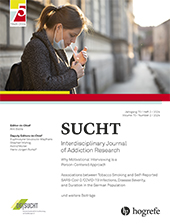Stressbewältigungstrainings als Komponente betrieblicher Suchtprävention
Abstract
Ziel: Die suchtpräventive Wirkung eines spezifischen Stressbewältigungsprogramms wird auf der Grundlage einer längsschnittlichen Interventionsstudie mit 3 Messzeitpunkten, an der 105 Beschäftigte teilnahmen, überprüft. </P><P> Methoden: Das Stressbewältigungsprogramm beruht auf der Konzeption von Siegrist und Silberhorn (1999) in Verbindung mit suchtpräventiven Komponenten aus dem Programm von Schelp, Gravemeier und Maluck (1997). Das Programm zielt insbesondere <OL><LI>auf den Abbau übersteigerter Kontrollambitionen (Typ-A-Verhaltensmuster), <LI>die Veränderung der Trinkfunktionen und <LI> den Alkoholkonsum selbst. </OL> Es erfolgte eine zufällige Zuweisung der Probanden zur Experimental- oder Kontrollgruppe. Die Kontrollgruppe nahm zunächst nur an den Datenerhebungen teil und erhielt das Training nach Abschluss der Nachuntersuchung angeboten (Wartelisten-Bedingung). Die Teilnehmer füllten Fragebogen hinsichtlich ihrer Kontrollambitionen, des Alkoholkonsums und der Trinkfunktionen (Wirkungserwartungen bei Alkoholkonsum) zu Beginn und am Ende des Trainings sowie drei Monate später (follow-up) aus. </P><P> Ergebnisse: Die Akzeptanz des Programms war hoch. Die Follow-up-Untersuchung nach drei Monaten zeigte eine signifikante Reduzierung des Alkoholkonsums, der Kontrollambitionen und Trinkfunktionen (Wirkungserwartungen bei Alkoholkonsum). Allerdings besteht zwischen dem Rückgang der Kontrollambitionen und der Reduktion des Alkoholkonsums kein Zusammenhang, sodass letztlich unklar bleibt, durch welche Faktoren der Rückgang des Alkoholkonsums bewirkt worden ist. </P><P> Schlussfolgerungen: Die Teilnahme an betrieblichen Stressbewältigungstrainings mit suchtpräventiven Komponenten kann zu einer Reduktion des Alkoholkonsums führen.
Objectives: The preventive effect of a specific stress management programme was evaluated on the basis of a longitudinal intervention study with 3 measuring points. 105 employees participated in the study. </P><P> Methods: The stress management programme is based on the concept of Siegrist and Silberhorn (1999), together with preventive components from the Schelp, Gravemeier und Maluck programme (1997). The programme is particularly aimed at <OL><LI> reducing excessive control ambitions (Type ABehav-ior Pattern), <LI> changing the expectations of the effects of alcohol consumption (drinking functions), and <LI> reducing the alcohol consumption itself. </OL>The subjects were randomly assigned to the experimental group or the control group. The control group was offered the stress management training after the follow- up (waiting list condition). The participants answered a questionnaire regarding their control ambitions, their alcohol consumption and their expectations of the effects of alcohol consumption. </P><P> Results: The acceptance of the programme was high. Follow-up examination after three months showed a significant reduction in control ambitions, their alcohol consumption and their expectations of the effects of alcohol consumption. However, no correlation could be found between the reduction in control ambitions and the reduction in alcohol consumption, so that it remains ultimately unclear by what factors the reduction in alcohol consumption was caused. </P><P> Conclusions: The participation in workplace stress management programmes with addiction prevention components can lead to an reduction in alcohol consumption.



